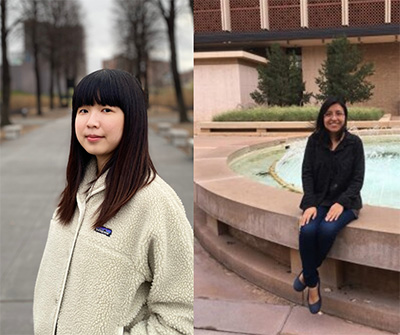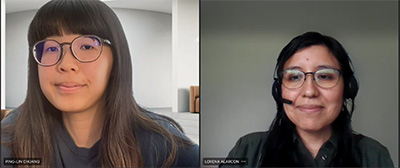Featured Interns: Lorena Alarcon and Ping-Lin Chuang

Meet Lorena and Ping-Lin, the 2023 WIDA summer research interns! Lorena and Ping-Lin are Ph.D. students at the University of Illinois at Urbana-Champaign. They spent the summer working with the WIDA assessment team and contributed to multiple research projects.
Scroll down to read interviews between Lorena, Ping-Lin and Hannah Haynes, a WIDA staffer.
Note: The following content has been lightly edited for clarity and length.
Hannah: What are you studying at the University of Illinois at Urbana-Champaign?
Lorena: I am studying Spanish linguistics, second language acquisition, and teacher education.
Ping-Lin: I’m getting a Ph.D. in linguistics with a graduate concentration in second language acquisition and teacher education.
Hannah: What do you like doing in your free time?
Lorena: I like to listen to music in my free time.
Ping-Lin: I enjoy traveling, watching documentaries, and spending time with my cat.
Hannah: What’s a fun fact about you?
Lorena: I have been interested in languages since I was a child.
Ping-Lin: Before pursuing my Ph.D. degree, I was an EFL teacher and an English test developer.
Hannah: Why WIDA? What about the WIDA summer research internship piqued your interest?
Lorena: I learned about WIDA when I attended LARC 2022. After I explored the WIDA website, I realized the WIDA Summer Research Internship Program aligned with my research interests and future goals. Then, I decided to apply for the internship.
Ping-Lin: I first learned about WIDA from my advisor, Dr. Xun Yan. He encouraged me to apply for internships to gain more research experience. The WIDA Summer Research Internship piqued my interest because it is a great opportunity to delve into language assessment and development in K-12 settings.
Hannah: What have you been working on during your time at WIDA?
Lorena: I have been working on the Standards-to-Assessment Literacy Project and the First Nations Languages Project. The first project intends to examine (1) educators’ understanding of the impact of WIDA 2020 English Language Development (ELD) Standards on WIDA ACCESS for ELLs and also (2) ways to enhance educators’ assessment literacy on standards implementation on the assessment. The second project explores the learning and assessment of First Nations Languages for early childhood.
Ping-Lin: I have been involved in two research projects during my time at WIDA. One project focuses on the validation of the newly developed ACCESS for ELLs writing scoring scale. We are analyzing scoring data to determine if the new scale may be used for operational scoring. The other one examines students’ speaking performance on the ACCESS for ELLs speaking test. We are looking at the developmental patterns of fluency and complexity features across grade levels.
Hannah: Are there things you’ve learned that you will bring to your next professional endeavor?
Lorena: The opportunity to collaborate with WIDA researchers and the Wisconsin First Nations Early Childhood Circles of Reflection group allowed me to gain valuable knowledge and skills that I intend to apply to my Ph.D. studies and future career.
Ping-Lin: By working on these two projects, I improved my skills in data processing, analysis, and visualization. I also learned how to effectively disseminate research findings to different audiences. These are all valuable skills I can apply in future research projects.
Hannah: What’s one thing you’ve learned that you’d like educators around the country to know?
Lorena: I would like that educators around the country know the valuable work that WIDA and the Wisconsin First Nations Early Childhood Circles of Reflection group do. I appreciate the WIDA efforts to support multilingual learners and educators. I also appreciate the work that WIDA and the Wisconsin First Nations Early Childhood Circles of Reflection group do to support First Nations Languages.
Ping-Lin: The process of developing a valid and reliable test is extensive and requires collective efforts of researchers and educators. My experience at WIDA taught me that educators' input is highly valued, and their feedback has a significant impact on important decisions. This collaboration enables WIDA to continue to support the development of multilingual learners in this country.
Hannah: Do you have any plans for the future? How much time do you have left in your Ph.D. program? Or do you know what jobs you’ll be interested in holding in the future?
Lorena: I am in the middle of my Ph.D. program, so that’s what is next in the immediate future. I am open to job opportunities that I may have in the future. I am also interested in continuing my work on projects related to language testing and assessment.
Ping-Lin: I am in the final stages of completing my dissertation and anticipate graduating in May 2024. Following graduation, my aspiration is to secure a research-oriented role within a university or an educational technology company.





